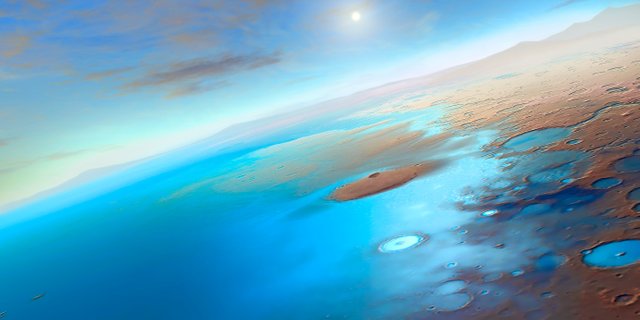A hidden ocean lurks deep beneath the crust of Mars/Un océano oculto se esconde en las profundidades de la corteza de Marte

Source
The idea that Mars once had oceans and rivers is gaining increasing acceptance among scientists. Scientists believe that Mars experienced a warm, wet period between 3.8 and 3 billion years ago, during which the planet is thought to have had a thicker atmosphere and higher temperatures, allowing for the existence of liquid water on the surface.
La idea de que Marte albergó océanos y ríos en el pasado es cada vez más aceptada por la comunidad científica, los científicos creen que Marte experimentó un período cálido y húmedo hace entre 3.800 y 3.000 millones de años, durante el cual se cree que el planeta tenía una atmósfera más densa y una temperatura más elevada, lo que permitía la existencia de agua líquida en la superficie.
Over time, Mars lost much of its atmosphere due to a variety of factors, including the loss of its magnetic field and interaction with the solar wind. As the atmosphere became thinner, the temperature dropped and liquid water began to evaporate and freeze until Mars became the wasteland we see today.
Con el tiempo, Marte perdió gran parte de su atmósfera debido a diversos factores, como la pérdida de su campo magnético y la interacción con el viento solar. A medida que la atmósfera se volvió más delgada, la temperatura disminuyó y el agua líquida comenzó a evaporarse y congelarse hasta que Marte se convirtió en el erial que vemos ahora.

Source
But a new study suggests that there is still plenty of water locked away deep in the planet's crust. The main evidence comes from data collected by NASA's InSight lander. By analysing seismic waves rippling through the Martian interior, scientists have detected anomalies that suggest the presence of large amounts of liquid water several dozen kilometres below the surface.
Pero un nuevo estudio sugiere que aún queda mucha agua encerrada en las profundidades de la corteza del planeta. La evidencia principal proviene de los datos recogidos por el módulo de aterrizaje InSight de la NASA. Tras analizar las ondas sísmicas que recorren el interior marciano, los científicos han detectado anomalías que sugieren la presencia de grandes cantidades de agua en estado líquido a varias decenas de kilómetros bajo la superficie.
It is estimated that this reservoir of water could cover a large part of the planet with a layer several kilometres thick that is located at an estimated depth of between 11 and 20 kilometres below the surface. This discovery has enormous implications for our understanding of the history of Mars and the possibility of life on the red planet.
Se estima que esta reserva de agua podría cubrir gran parte del planeta con una capa de varios kilómetros de espesor que se encuentra a una profundidad estimada entre 11 y 20 kilómetros bajo la superficie. Este descubrimiento tiene enormes implicaciones para nuestra comprensión de la historia de Marte y la posibilidad de vida en el planeta rojo.

Source
This discovery has generated great interest in the scientific and space community and will drive new missions to Mars focused on subsurface exploration and the search for water, since the presence of water on Mars would be an invaluable resource for future manned missions, as it could be used for drinking, growing food and producing fuel, in addition to the fact that the existence of liquid water significantly increases the possibility of finding life on Mars.
Este hallazgo ha generado un gran interés en la comunidad científica y espacial e impulsará nuevas misiones a Marte enfocadas en la exploración del subsuelo y la búsqueda de agua, ya que la presencia de agua en Marte sería un recurso invaluable para futuras misiones tripuladas, ya que podría utilizarse para beber, cultivar alimentos y producir combustible, además de que la existencia de agua líquida aumenta significativamente la posibilidad de encontrar vida en Marte.
There are still questions to be answered: Is it pure water or does it contain salts and other minerals? Is the water in liquid or frozen form? And above all, how could we access this water and bring it to the surface?
Whatever the case, there is no doubt that this discovery could greatly facilitate the colonization of Mars.
Aún quedan preguntas por resporder, ¿Es agua pura o contiene sales y otros minerales?, ¿Está el agua en forma líquida o congelada? y sobre todo¿Cómo podríamos acceder a esta agua y subirla a la superficie?.
Sea como sea no cabe duda de que este hallazgo podría facilitarnos en gran medida la colonización de Marte.
More information/Más información
https://www.popularmechanics.com/space/moon-mars/a61867995/mars-hidden-ocean/
https://www.esquire.com/es/ciencia/a61875008/marte-oceano-oculto/
Sometimes I started wondering what might have happened for it to be found at the ocean actually. Well probably something happened randomly to get there but I am so sure people will definitely figure it out in due time. I don't really think those types of water can be pure water. It might actually contain a lot of salts and minerals or both together or what do you actually think?
You are right, with this new discovery, I am so sure that day by day, we are actually getting near to the colonisation of the mars and it is happening right now which is a beautiful thing to actually behold.